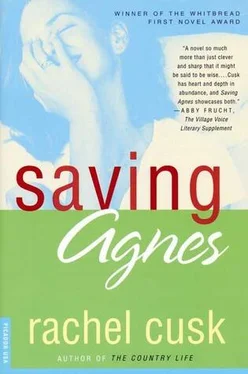‘Come on!’ she shouted behind her.
Agnes trotted disconsolately after her. The trees loomed, vague and monstrous. She couldn’t see anything. Merlin and Nina’s laughter faded into the distance. As she jogged unseeing over the dark grass she felt a wave of panic wash over her and she picked up speed. The road near the park had gone quiet. Everything seemed to be concentrated into the darkness, the silence, the pounding of her blood, the beating of her heart as she ran. It was as if she was without senses, living inside herself. It was as if she wasn’t there at all. Her fear turned itself inside out. She kept running. It seemed to her then that she could go on like that for ever.
‘Agnes? Can we come in?’
Nina and Merlin put their heads round the bedroom door. Agnes sat up in bed and tried not to look ashamed. She had not disappeared for long, really: she had just run round the park until she had happened by chance on the roadside, where her ardour had been cooled by the sight of houses and cars and she had come home. On her way she had heard them calling for her, and had had a strange sense then of being someone else: a lone jogger returning to a different life, who had heard two friends calling to a girl lost in the woods. She had pitied that poor girl and wondered if she would read about it in the papers tomorrow. Then she had walked slowly back to Elwood Street.
She had hoped to feel a certain snarling, callous independence in doing so, but instead had been able only to think of a time when aged about twelve, she had taken her bicycle and pretended to run away. She had pedalled until she reached a grassy bank about a mile from the house, and then had dismounted from her steed, mounted the bank, and lain leisurely down to look at the sky. When it began to grow dark and she had judged enough time to have passed, she had climbed back on to her bicycle and had pedalled home, to find that her parents had worked themselves up not into the hoped-for lather of loving anxiety, but into a state of uncontainable anger. She had been shouted at, smacked, and sent to bed, where she was left to ruminate upon the now-proven fact that nobody loved her.
‘Are you okay?’ said Nina, looking at her strangely.
‘What happened?’ said Merlin, hovering uncertainly by the door.
‘I’m fine. Sorry,’ Agnes said, as if they might have preferred to find her lying mauled by a mugger’s knife beneath some tree. ‘I don’t know what happened. I was running after you and I couldn’t find you. So I came home. I was frightened.’
Merlin nodded vaguely. Nina looked pensive. They didn’t believe her. They thought her strange, she knew. They would not blame the difficult world. Everyone else dealt with it. Why couldn’t she?
‘What’s wrong?’ demanded John, slamming the door to his bedroom. He lunged towards her pugnaciously and then brought himself up short.
‘Nothing,’ said Agnes, attempting flippancy. ‘Your bedside manner could stand some improvement, though.’
‘Oh, come on,’ he said more softly. He sat down beside her and put his head in his hands. ‘What have I done to deserve this? I thought I was being reasonable. I mean, what is this?’ He indicated the half-shut drawer of his desk, out of which letters and papers, hastily replaced, erupted incriminatingly. ‘What are you looking for?’
‘I just want to know if you’re seeing someone else.’
He wasn’t, of course, she knew that. He would never have denied himself the pleasure of telling her. She would have found that simple, in any case, a jealous ague, mild in comparison to the mad fever which currently gripped her. She phoned him in the middle of the night, too, not saying anything, just wanting to hear what he sounded like when he was alone. He made a fist and swung it in the air, then walked to the other side of the small room. Maybe small rooms were the problem. They could never see each other properly.
‘You won’t find what you need there,’ he said, looking at the burgled drawer. ‘In fact, I don’t even know what you need.’
‘You should do,’ she replied. He had made her need it, after all.
‘But I’ve given you everything,’ he said. His tone was quizzical, interested, as if she were an experiment that had got out of control, a monster he had inadvertently created. ‘What do you want to do?’ he said then, jokingly. ‘Eat me?’
She felt his cruelty slide insidiously into her like a knife. How could she explain, when he made a mockery of the truth, that the smoke in his eyes was but a whiff of the raging inferno below? That what she showed him were but tiny lesions atop a deep and raging cancer? She wanted him to be mother and father to her, to rewrite her history in his hand, to exhume all her years and bury him in their place; kill all of her that never knew him and forget the rest. She wanted him dead or alive, and her feelings were terminal.
‘I want — I want to believe in you,’ she said finally.
‘Like fucking God!’ he exclaimed almost gleefully. ‘That figures.’
He exalted for a moment at this pinnacle, as if it were what he had always wanted, as if he had wanted all along to see how far he could make her go. Then he got up and strolled impatiently around the room, losing interest. She felt then as if she would surely die of him. Outside the summer evening faded quietly to darkness. She sat perfectly still and waited for him to turn around. She needed to see his face. When he finally faced her, he appeared surprised that she was still there. He looked at her doubtfully, appraisingly; as if, she thought, he’d never seen her before. As if she were something in a shop he was deciding whether to buy. He looked at her with a kind of weary langour: he wanted to be home, unencumbered by packages, away from this madness; he wanted to be alone.
‘You’re like — you’re like some kind of black hole,’ he said curiously. He sat down in an armchair and for the first time looked at her as if she frightened him. ‘You consume me.’
LOVE was uncourtly at Hampton Court: it divorced, beheaded and died; divorced again, was beheaded an improbable twice, but still, ultimately, survived. Love conquered all but the loveless, and even then sometimes other things got you first.
Like disease, Agnes thought, or maybe childbirth. The dimly ornate bedchamber, which they were surveying from behind its restraining rope like visitors to an asylum, seemed suddenly racked with screams as an heir clawed his way out from a cloying, unanaesthetised womb; his mother two-headed then, like a mythic beast. The rules were different in those days, she thought, but the game was the same.
The house and gardens lay posing like two beauty queens, competing for the beholder in whose eye they might see their rival beauties briefly borrowed. He was beguiled by the gardens, she transfixed by the house; each sensing something of their own shadow in the other’s choice which made them defend their favourite hotly. A strange discomfort arose between them, a kind of twinnish mistrust, as they remembered that while each possessed the properties of beauty, together they formed something that made people stare.
It had occurred to her to wonder if he might simply be tired of her; had crossed her mind like a delayed commuter over a busy station, too frenzied and obvious to be interesting. As an insomniac of the heart, Agnes found such admissions unwise; they could keep her awake at night, tucking the darkness round her like an eiderdown of oblivion. The worst of it was that she sympathised with him.
As they crossed the moat into the cool belly of the palace she felt them both to be absurd. Like fish, their confluence depended on a common environment without which they flopped and gasped separately. It was easy to love in dim bars and dark bedrooms, but their bond could not withstand historic transposition. The fact that he was tired of her actually came as no surprise; that she was tired of herself even less so. What disturbed her was the alertness of her need for him amidst all this somnambulance. It beat in her like a heart, unfathomable. Something had been exchanged in those early hours when he had still been free to choose her, and he had been paying for it ever since. She would appear on his doorstep in years to come while he hid behind curtains with a frightened wife and bewildered children, reminding him that once he had singled her out. It was not about affection or delight. It was a game she had to win.
Читать дальше












